What are polymer coated gloves and how to choose them?
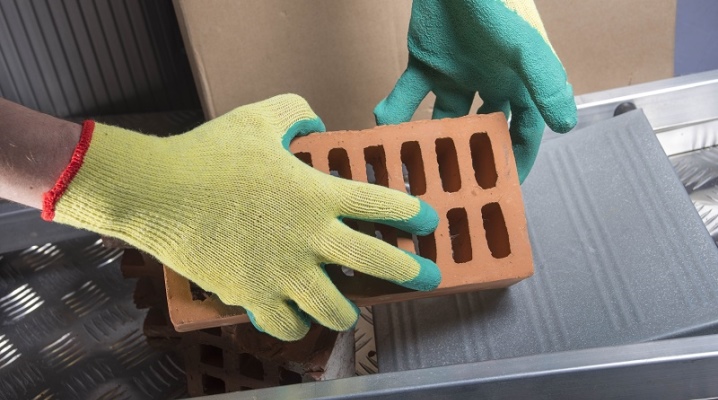
When performing any physical work, you need to wear protective equipment, the best of which are polymer-coated gloves. They not only save hands from the harmful effects of an aggressive environment, dirt, but also reduce injuries. To make it comfortable to work in them, you should choose the right type of product, taking into account the size and material from which it is made.


Features and scope
Polymer coated gloves are one of the most common personal protective equipment made from polymer raw materials. The main feature of this product is considered to be good adhesion to any surface. Thanks to a special coating, the skin of the hands in such gloves breathes and does not sweat. The advantages of a protective agent also include:
- high tightness;
- increased level of comfort during work;
- wear resistance;
- long term of use;
- reasonable price.
For gloves with this coating to provide the maximum level of protection, they must be tight-fitting and appropriate to the size of the wearer.


During the production of these gloves, the requirements of GOST are adhered to, a description of which can be found in directives 12.4.010-75 and 12.4.183-9 (personal protective equipment produced with a polymer coating must be of high quality and be safe to use). For the manufacture of these gloves, exclusively environmentally friendly raw materials are used that do not cause allergic reactions. The edge of the cuffs in gloves is made of viscous rubber, so that they do not allow small debris, dust to pass through and fit as tightly as possible to the hand. To further improve the performance of the protective agent, manufacturers combine different materials during their manufacture.
All polymer coated gloves have their own knitting class, it is determined by the number of loops per inch. The wear resistance of the product largely depends on this indicator. Gloves of the highest class are considered the best, they have increased comfort. As for the scope of application of such gloves, they are widely used when doing household work, in car services and in agriculture.
Nitrile coated products are recommended for handling liquid chemicals, and knitted gloves are usually chosen for simple jobs.
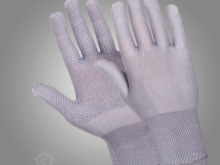
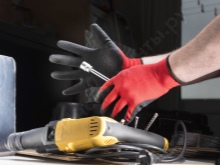

Species overview
Today, many varieties of polymer-coated gloves are produced, each of which has its own performance characteristics and is designed for a specific type of work. The most common are knitted, nylon gloves, as well as gloves with polyurethane, PVC, nitrile coating and dot pattern.
On sale, you can often also find a frost-resistant version of a protective product, in which the base is made of cotton, and the cuff is made of rubber. Rubber gloves are also very popular, they are not afraid of the negative effects of solvents, fuels and lubricants and are resistant to concentrated acids. If you plan to perform several types of work at the same time, then it is best to choose combined gloves. They are considered versatile and resistant not only to mechanical damage, but also to alkalis and acids.
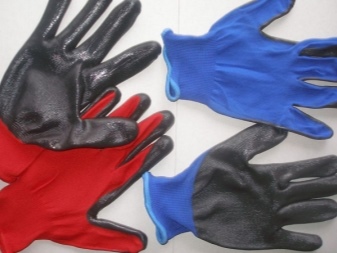
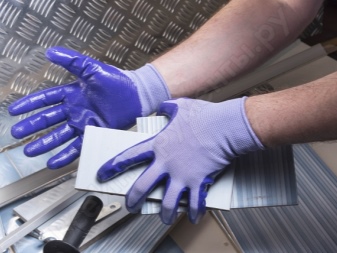
Knitted
Such gloves are available with several types of patterns, the most popular of which are:
- Herringbone - sharp corners are applied to the entire surface of the palm;
- "point" - characterized by spot application over the entire inner surface of the glove;
- "Waves" - looks like a wavy coating;
- "brick" - the drawing is made in the form of imitation of brickwork;
- "Stripes" - the lines are parallel to each other at a short distance.
Gloves with the name or logo of the company are considered the most expensive; they are often used for advertising purposes. The jerseys have no seams, which greatly reduces the likelihood of skin irritation. The advantages of products include an affordable price, high quality, comfort while wearing. There are no downsides.

Polyurethane-coated
Work gloves with this type of spray are intended exclusively for small jobs, they provide a good grip. The base of the product is represented by nylon and polyester, it is covered with a layer of polyurethane on top. You can find such gloves on sale with anti-vibration properties.
Advantages of the product: they are flexible, fit perfectly on the hands, and are resistant to tears and punctures. There are no downsides.

PVC coated
Gloves of this type are intended for handling and packaging operations. Their base is made of PVC (cotton thread is used for knitting), and the elastic rubber cuffs are processed with an overlock. The gloves are antibacterial and highly resistant to moisture. Such products are produced in various densities, which depend on the knitting class and the number of threads. The higher the knitting class, the smaller the distance between the threads, and, accordingly, the fabric is more durable.
PVC-coated protective agents are usually produced in the 7th class. (knitted from yarn with 6 threads). The advantages of the product include affordable cost, high resistance to mechanical damage. There are no downsides.

With nitrile layer
Gloves are a multi-layer product made from a polymer (nitrile) with enhanced protection properties. They can be used when working with fuels, paints and varnishes and oil products. Protective products with a nitrile layer are characterized by high strength, rigidity, perfectly retain the sensitivity of the fingers and fit the wrist tightly. As for the shortcomings, there is only one - the price for such gloves is above average.

Dot pattern
This type of product is recommended to be used to protect the skin of the hands from chafing, therefore it is often chosen by summer residents to perform work on their personal plot. Gloves have good breathability, slip and mechanical damage. They can also be used in production, but only in the summer. The products have no drawbacks.

Nylon
This type of gloves is ideal for plastering work, as the product protects hands well from oil and other contaminants, while maintaining high sensitivity of the fingers. These gloves can also be used by glaziers. The advantages of the product include increased wearing comfort.

Insulated
For outdoor construction work, maintenance of drilling platforms at sea, highways and during winter transportation, insulated gloves will provide reliable protection for your hands. They are produced in multi-layer, complemented by a warming knitted liner. These gloves are highly durable. As for the shortcomings, they were not noted.

Frost resistant
In the chemical and oil refining industries, in the household, in construction, frost-resistant gloves are widely used. They have an insulated lining made of brushed acrylic knitwear, and are covered with an oil and petrol resistant layer on the outside. Such gloves withstand temperatures up to - 45C, are characterized by high strength. They have no negative reviews.

Dimensions (edit)
To make it convenient to work, you need to correctly select the size of protective equipment, especially for gloves produced with a polymer coating, which should sit firmly on the hand and not slip. GOST provides for several universal sizes of work gloves:
- L - large;
- M - medium;
- S - small.
To correctly determine your size, you should first measure the brush just above the bone. Then round off the figure and divide by a factor of 2.7. The result is a value that is rounded to the nearest integer. This will be the size you want.


Selection Tips
When buying gloves with a polymer layer, it is important to pay attention not only to their size, but also to their performance. A huge role is also played by the conditions under which it is planned to use the protective agent, namely:
- to protect hands from various mechanical damage, knitted gloves are considered the best;
- for working with acids, chemicals and alkalis, products with a nitrile coating will be an excellent choice;
- when building in the winter season, it is recommended to use an insulated or winter version;
- to protect your hands from dirty, oily and damp surfaces (objects), you need to buy products with a double coating.


In addition, the class of gloves should also be taken into account.
- The coarsest and thickest are class 7 protective equipment. They are suitable for work in warehouses, construction sites and in agriculture.
- Grade 10 gloves are of medium density as they are made of thin material. Such products are usually chosen for work in repair shops, for packaging goods in supermarkets and stores.
- Products of the 13th class are considered the thinnest and providing high sensitivity of hands. It is recommended to purchase them in order not to stain expensive material (parts).
Additionally, you need to check with the seller and the availability of certificates for gloves. Each product must be marked, which indicates not only the manufacturer, but also the scope, the degree of protection.


In the next video you will find a brief overview of SP-0001 and SP-0137 polymer coated nitrile gloves.













The comment was sent successfully.